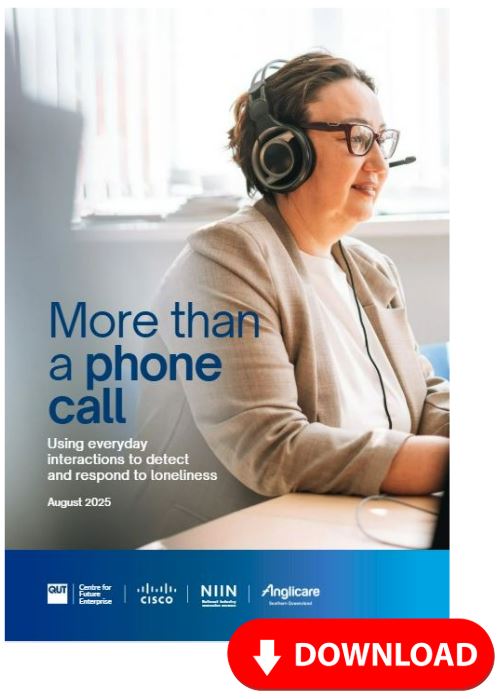
Loneliness is more than a personal struggle, it’s a national issue costing Australia $2.7 billion annually in healthcare, social services, and lost productivity. But what if one of the most overlooked solutions lies in a place we rarely associate with emotional wellbeing: the contact centre?
A new whitepaper, titled More than a phone call: Using everyday interactions to detect and respond to loneliness, reveals how contact centres can play a transformative role in tackling this growing crisis.
The untapped power of everyday interactions
According to Dr Nadine Ostern, Cisco Chair in Trusted Retail at QUT and co-author of the paper, we need to shift how we think about loneliness, and where we look for solutions.
“This whitepaper asks us to see loneliness differently: not as a marginal issue, but as a challenge that organisations can play a role in addressing,” says Dr Ostern.
Rather than replacing human connection with technology, the paper argues for using digital innovation and human-centred design to enable meaningful interactions, especially in contact centres, where thousands of conversations happen every day.
Why contact centres matter
Developed in collaboration with Anglicare Southern Queensland and supported by Cisco, the research highlights how contact centres can evolve into hubs of empathy and trust. Anglicare, for example, handles over 30,000 calls each month, many from elderly Australians who may be experiencing social isolation.
The paper identifies five key shifts for contact centres to embrace, including:
- Moving from reactive problem-solving to proactive engagement
- Transitioning from siloed operations to integrated, data-driven platforms
- Designing care models that prioritise emotional as well as functional needs
These shifts are supported by global case studies and practical frameworks that show how to embed relational care into service delivery.
Recognising the signals of loneliness
One of the most powerful insights from the research is that loneliness often hides in plain sight. Frequent, prolonged, or seemingly low-need calls, typically flagged as inefficiencies, can actually be subtle signals of unmet emotional needs.
Without the right protocols, frontline staff are left emotionally burdened, and trust between customers and organisations begins to erode. But when organisations respond with empathy and intention, they unlock deeper customer loyalty, operational resilience, and more responsible digital transformation.
A scalable, human-centred approach
The whitepaper introduces a flexible intervention spectrum – human, augmented, and automated – designed to support scalable, empathetic responses without overwhelming staff. It also outlines six actionable recommendations, from staff training to impact measurement, to help organisations embed early detection and relational care into their service models.
“In a world increasingly dominated by automation, trust becomes a defining advantage,” says Dr Ostern. “Contact centres, when reimagined as hubs of empathy, offer a scalable and stigma-free way to foster that trust, turning everyday service interactions into moments of meaningful connection.”
As loneliness continues to rise, the question for organisations is no longer whether they should act, but how. This research offers a roadmap for doing just that, showing how technology, when guided by empathy, can serve human good.
Join us for the launch event
If this research resonates with you, we invite you to be part of the conversation at the upcoming whitepaper launch.
Reimagining Connection in a Disconnected World: Launching the New Cisco Whitepaper
Tuesday, 28 October 2025 | 5 – 7 pm | Find out more and register
This event brings together researchers, industry leaders, and service innovators to explore how contact centres can become powerful tools for social impact. Hear directly from the authors, discover real-world applications, and connect with others who are rethinking the future of customer care.
Download the whitepaper
 |
Ostern, Nadine, Colville, Shannon, Bandara, Wasana, Haslam, Catherine, & Coulon, Sophie (2025) More than a phone call: Using everyday interactions to detect and respond to loneliness. QUT Centre for Future Enterprise. |
This whitepaper is part of a broader research agenda at CFE focused on trust – how it’s built, sustained, and scaled in a rapidly changing world. Across areas like customer experience, digital transformation, and organisational design, our research explores the systems and behaviours that build and sustain trust in complex environments.
Interested in how trust drives innovation and resilience? Explore our latest research, insights, and initiatives shaping the future of Trusted Enterprise or email us at future.enterprise@qut.edu.au
